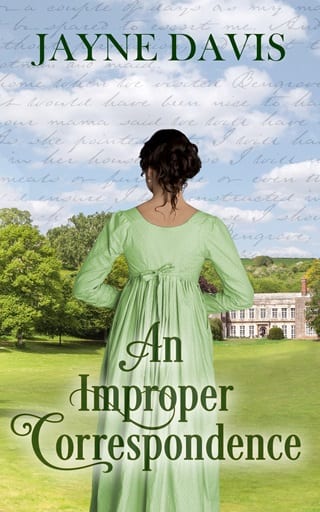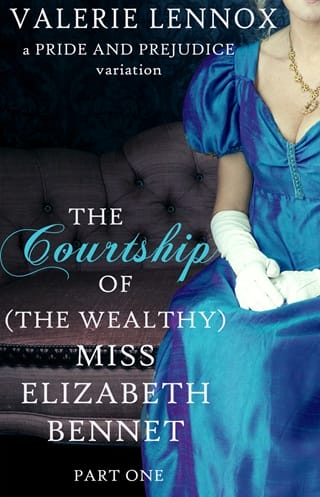Chapter 10
CHAPTER 10
L ondon, August 1813
"Jo?" Papa's voice came from his study as Jo removed her bonnet and handed it to Chivenor.
She found her father sitting at his desk with the usual piles of papers in neat rows in front of him. "Is something wrong, Papa? Has something happened to Mama?" she added, with sudden anxiety. The doctor had been due to call this morning.
"No, no. She's much as usual. No worse, but no better, either. Doctor Walsh prescribed a stronger tonic, which he said would help. No, this is about you." He waved a hand, and she sat down. "Can you explain this?"
Papa picked up an opened letter from his desk and held it out. He usually had a smile for her, but now, although he wasn't looking angry, he clearly wasn't pleased with her.
Dear Mr Stretton,
I write to thank you for sending materials to my brother in France. He did not know exactly how much you had expended on his behalf, but hopes that the enclosed will cover it .
My thanks again.
Wm. Delafield, Esq.
Oh. Her anxiety returned—no, that feeling was disappointment that Papa would now forbid her correspondence with Captain Delafield. But that was silly; it wasn't as if she even knew the captain, not really.
"Explain, Jo."
"It is repayment for the two books I sent. You recall, Papa, I asked if they could be sent by the bank to stop them being stolen or confiscated?" She realised she was twisting the fabric of her skirt in her fingers and made an effort to still her hands.
"I remember very well. What I do not recall is you intending to send them to anyone other than Captain Bengrove."
"I don't think Alfred is interested in those kinds of books," Jo said.
"Don't change the subject, Jo. I can well believe he is not, but that is not the point. No, no," he went on as she was about to speak. "I'm sure you did not lie to me. You're too clever for that. You just managed not to mention that you are corresponding with a man other than Bengrove!"
"There's no harm done, Papa, is there? He is the one who helped Alfred to write when he was injured. Alfred says he is old."
Papa leaned back in his chair and looked at her thoughtfully for a few moments, until Jo wanted to squirm. "Whether harm has been done remains to be seen. If word of it gets out, the Bengroves will not approve, and nor will your mother."
"Who is going to tell them?"
"Bengrove, perhaps? If Delafield is his friend?—"
"I don't think they are friends, Papa." Alfred certainly didn't like Captain Delafield—there had been further disparaging comments in Alfred's letters. And surely, if the captain liked Alfred, he would have said something to Alfred about the sarcasm in her letter, rather than writing to her to say that Alfred had not understood it?
"Oh?" Papa waited a moment with raised brows, but Jo did not elaborate. "It is most improper, whether or not they are friends. In fact, it might be better if they were friends! We don't know anything about this Delafield. How did he come to ask you for those books? Did Bengrove ask for them?"
Jo shook her head.
"Does Bengrove even know that you are writing to another man?"
"I don't know. I don't think so."
Papa put his fingers to his forehead for a moment before looking back at her. "How did it come about? Did you write to him first?"
"No, Papa. It just… well… happened."
"You have kept the letters?"
Jo nodded.
"Go and get them."
She had to obey. But there was nothing improper in the letters themselves; if her father saw that he would not be too angry. Would he?
She took Captain Delafield's letters out of the drawer in her dressing table and, after a moment of hesitation, added Alfred's letters as well. Back in the library, she sat down opposite Papa again and handed over Captain Delafield's letters.
Papa read the first one, looking puzzled. "What sarcasm had you written to Bengrove?" he asked.
She handed him the letter from Alfred that had annoyed her. "I replied to that letter, Papa. I was… not pleased that he had dictated such things to a stranger, and his complaints seemed self-pitying. I wrote him a very sarcastic letter about how gracious his mama had been when we visited, and how good it would be if I lived there and I didn't have to think for myself at all. And how I always have to have permission to go out and be accompanied."
"Sarcastic, Jo? You?" To her relief, Papa was beginning to look amused. "So Bengrove detected no sarcasm, but this Captain Delafield did?"
"Yes, Papa. Alfred has not asked after Mama's health at all, either." To her disappointment; he had not seemed so uncaring when they were together at Yelden. "You can read his letters, too, if you wish."
"They are full of these lover-like phrases? "
"Yes, Papa," she said demurely. "But generally the same ones each time."
He raised an eyebrow at that. Jo sat while he read the other letters from Captain Delafield, trying to discern from his expression what he was thinking, but failing completely. When he finished, he stacked them neatly and set them to one side. "What, beside the books, did you send via the bank?"
"Only some back copies of the Gazette . Mostly ones with Lord Wellington's dispatches, or reports about the battles in northern Europe. And, er…"
"Go on."
"I, er, took the liberty of writing to Mr Pakenham in Frome on your behalf. He visited Lieutenant Daniau. I sent his letter and a picture his daughter drew to the captain."
He frowned. "That was rather a liberty, Jo."
She looked down at her hands clasped in her lap. "I'm sorry, Papa."
Papa sighed. "So sending the picture was a final gift?"
"Papa, he was very glad to have the Gazettes . He says, as you saw, that there is no regular supply of newspapers, and many of the other officers also enjoy reading them. I'd thought to continue to send such things."
"What do you know of him, Jo?" Papa still had Alfred's letters spread out before him, and turned to the first one written in his own hand. "Your betrothed does not seem to care for him much."
"He was injured serving our country. I thought to ease the boredom of captivity for him and his friends."
Papa looked at her, his expression thoughtful, then just nodded. "I need to think about this, Jo. You will promise not to write again unless I give you permission. And should any further letters arrive, you will give them to me without opening them."
"Yes, Papa. I give you my word."
"Very well. Send Farley back in, will you?"
Relieved to have escaped without a reprimand, Jo went to her room .
It was five days before Papa spoke to her again about the letters. She'd wanted to ask him when he would decide, but she held her tongue—appearing too eager might sway him against allowing her to write at all. Finally, not long after Chivenor had brought in a letter, he summoned her to his study again.
"You may continue to send Gazettes , and any other books or similar items that are requested. You will, however, keep any letters you receive, and I may ask to see them at any time. You will also keep copies of any letters that you send. Is that understood?"
"Yes, Papa. Thank you." She was surprised by the sudden relief she felt. Surprised, too, that her father had not forbidden her from writing—after all, it was not essential that the Gazettes were sent with accompanying letters. What had he been doing these last days? Had he found out more about Captain Delafield?
He reached into a drawer and handed her all the letters. "The top one arrived two days ago. Jo, if there is anything untoward in any of these letters, you will bring it to me immediately."
"Yes, Papa."
"And by ‘untoward', I mean anything that could not or would not be written to a sister , is that clear?"
"Yes, Papa."
In her room, Jo sat at her dressing table with the unopened letter propped against the mirror. Why had she felt so relieved that she was not forbidden to write back? She had only had a few letters from the captain, and they had mostly been responses to her offers of assistance.
No matter—she had permission now, and she would continue. She reached for the letter and broke the seal.
Dear Miss Stretton,
My thanks for the news of Lieutenant Daniau, and the portrait. Madame was so touched by it, and so pleased to have it, that she wept on my shoulder for a full ten minutes. It was very much appreciated and now has pride of place above the mantelpiece in the parlour. I cannot think of a more suitable gift for her, nor how to thank you properly for your efforts in obtaining it.
You mentioned in your last letter that you deal with business accounts. I have to admit to being curious, for this is surely unusual for a woman? Please be assured that I intend no criticism, and do not feel obliged to answer my query if you do not wish to.
You also mentioned not being able to make head nor tail of the content of the two books you sent. You are not alone in this; it took me some time to understand the first chapters, and that was achieved only with the help of my friends, who are more used to such things. For anyone to understand without the aid of a tutor would be beyond most people I know.
I am now able to get around with just one crutch, and hope to be promoted to the use of a stick before too much longer. This will be a great boost to my dignity, as one can attempt to convince oneself as well as onlookers that the stick is used merely for effect.
Yours, with respect,
Capt. Robert Delafield
Still smiling at that last paragraph, she wished, not for the first time, that she knew a bit more about the captain. At least she knew his name now.
Her assumption that he was old was based on a comment in one of Alfred's letters. But how old was he? It might be better not to find out too much. She did like his letters; they made her feel like a person and not merely a dutiful potential wife, as Alfred's did. Would it be even more improper if Captain Delafield turned out to be younger than she thought?
Verdun, September 1813
Rob received another packet of Gazettes about a month after the first, accompanied by a letter from Miss Stretton. He was pleased to see it, for it had occurred to him that Mr Stretton might not know of his daughter's correspondence. If so, a letter from Rob's brother with money for the books could have let the cat out of the bag. As he hadn't told Will to send it to her, he would naturally address it to her father.
The afternoon was sunny, so he walked to a tavern near the river and sat outside to drink ale and read the letter. It started by thanking him for the money, but went on to say that there was no need do so again; he could repay anything he owed once he arrived back in England.
You asked me about dealing with business accounts. Papa invests in many different enterprises, including shipping, canals, and various manufacturing ventures. He allows me to take part in many of his investment decisions, some of which involve looking through account books, and I make some small investments of my own. I am an only child, so Papa thinks it important that I understand something of his financial affairs. It is most satisfying to look into a business to see if it is worth investing in, and helping him to consider whether doing so could bring about changes to make it more profitable.
I hope you have progressed to using a stick. Be sure to buy a stylish one, to carry off the deception that it is merely a fashion choice.
He read through the letter again, carefully. What it did not contain was any indication that he should not write back. He was unaccountably pleased by this. More pleased than he should be.
Folding the letter, he replaced it in the packet, wondering what Miss Stretton was like. Bengrove had given a disparaging description of her—he recalled something about a scrawny beanpole and being bookish. But Bengrove wasn't the type to marry someone ugly or old just for the money, so he must have been exaggerating. And the bookish remark might simply have been due to her intelligence. Rob had heard some of his brother officers belittling women who read too much, or took an interest in business or politics. Others had talked about their wives in quite the opposite way, being glad that they were capable of making sensible decisions and could deal with things at home while they were away.
And what did looks count for, really? He absently rubbed the scar across his forehead. It had faded to a thin white line, now more visible as his face was going brown in the summer sun. He thought of his niece Eliza, his eldest brother's daughter. She was pretty, but although she could seemingly prattle on for hours about fashion or gossip, she had little else to say. And she giggled. If he ever married, it was not going to be to a girl who giggled.
But what was he doing thinking about marriage? He had to sort his life out first. And at the moment his life included Miss Stretton's letters, which he enjoyed reading. It felt like corresponding with… well, with what?
Not a sister; his sisters were all older, and he still felt mothered by them. If he told them his worries about the future, they'd just tell him to cheer up, find a nice pretty girl, and settle down on his farm. Getting away from that benevolent but overbearing management was why he'd joined the army in the first place.
A friend? He supposed so, although it felt different from his friendship with Moorven and Chadwick. When he'd mentioned his trouble deciding what he would do with the rest of his life, they had not sympathised much. It wasn't that they didn't care, more that they didn't understand. Moorven was destined to be an earl one day, and to Rob's mind, having to manage several large estates and take his seat in the Lords was a bit different from Rob's prospects of being stuck in a small farm in rural Gloucestershire. Not that he disliked the countryside, far from it, but it was the ‘small' and the ‘stuck' parts of that description that were dispiriting. And Chadwick, whom Bengrove would have considered well beneath him due to his father's background in commerce, had decided he was going try to get work as a consulting engineer and build bridges or canals .
He'd had enough introspection for one day, so he finished his ale and limped back to his lodgings. Unfortunately, the war meant that he'd have a lot more time to contemplate things before he had to make a decision about his future.
 Fullepub
Fullepub 



